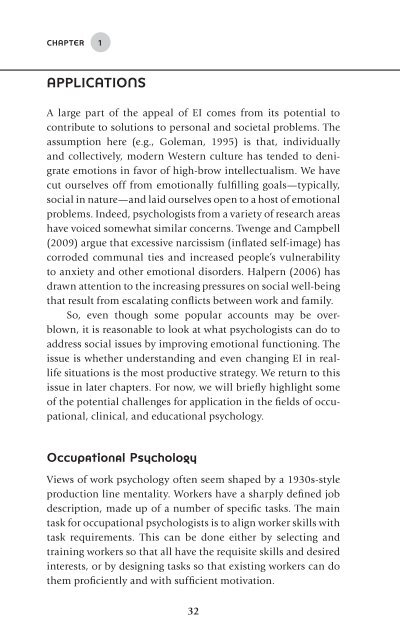Untitled - Springer Publishing
Untitled - Springer Publishing
Untitled - Springer Publishing
You also want an ePaper? Increase the reach of your titles
YUMPU automatically turns print PDFs into web optimized ePapers that Google loves.
CHAPTER 1<br />
APPLICATIONS<br />
A large part of the appeal of EI comes from its potential to<br />
contribute to solutions to personal and societal problems. The<br />
assumption here (e.g., Goleman, 1995) is that, individually<br />
and collectively, modern Western culture has tended to denigrate<br />
emotions in favor of high-brow intellectualism. We have<br />
cut ourselves off from emotionally fulfilling goals—typically,<br />
social in nature—and laid ourselves open to a host of emotional<br />
problems. Indeed, psychologists from a variety of research areas<br />
have voiced somewhat similar concerns. Twenge and Campbell<br />
(2009) argue that excessive narcissism (inflated self-image) has<br />
corroded communal ties and increased people’s vulnerability<br />
to anxiety and other emotional disorders. Halpern (2006) has<br />
drawn attention to the increasing pressures on social well-being<br />
that result from escalating conflicts between work and family.<br />
So, even though some popular accounts may be overblown,<br />
it is reasonable to look at what psychologists can do to<br />
address social issues by improving emotional functioning. The<br />
issue is whether understanding and even changing EI in reallife<br />
situations is the most productive strategy. We return to this<br />
issue in later chapters. For now, we will briefly highlight some<br />
of the potential challenges for application in the fields of occupational,<br />
clinical, and educational psychology.<br />
Occupational Psychology<br />
Views of work psychology often seem shaped by a 1930s-style<br />
production line mentality. Workers have a sharply defined job<br />
description, made up of a number of specific tasks. The main<br />
task for occupational psychologists is to align worker skills with<br />
task requirements. This can be done either by selecting and<br />
training workers so that all have the requisite skills and desired<br />
interests, or by designing tasks so that existing workers can do<br />
them proficiently and with sufficient motivation.<br />
32<br />
Matthews_PTR_Ch 01_12-10-11_1-42.indd 32<br />
10/12/2011 10:46:55 AM
















